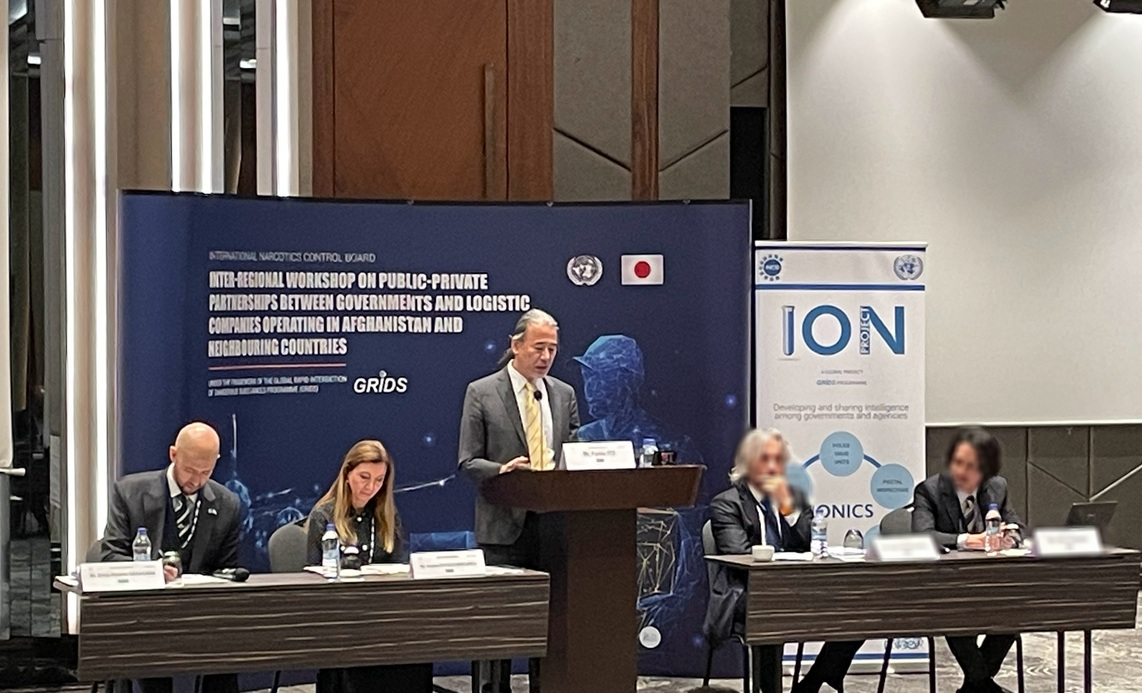GRIDS holds inter-regional workshop on Public-Private Partnerships between governments and logistic companies operating in Afghanistan and neighbouring countries

The Global Rapid Interdiction of Dangerous Substances (GRIDS) Programme of the International Narcotics Control Board (INCB) held a three-day Inter-regional workshop on Public-Private Partnerships between governments and logistic companies operating in Afghanistan and neighbouring countries, at Istanbul, Türkiye, from 28 to 30 November 2022.
The workshop aimed to build on the achievements of the previous meetings organized by INCB since 2018, both in-person and virtually, on the prevention of the misuse of logistic services (postal, express courier, air cargo, freight forwarding, and services by other third-party logistic (3PL) providers) for trafficking of dangerous substances (new psychoactive substances and non-medical synthetic opioids along with their relevant precursors). As Afghanistan, which has been known for illicit manufacture and trafficking of "classic drugs" under international schedules, and its neighbours are beginning to see flows of dangerous substances in recent years, the workshop focussed on discussing practical solutions and strategies to promote cooperation between governments and logistic companies operating in Afghanistan and the wider region for the prevention of the misuse of their legitimate services for dangerous substance trafficking.
At least 42 representatives and experts from 14 governments, 2 international organizations, 2 freight forwarding companies operating in Afghanistan, and 2 national logistic service providers associations were brought together in the workshop to share their respective experiences in preventing the misuse of legitimate logistic services. The participants highlighted the problems associated with the constantly evolving modus operandi and the misuse of logistic companies for trafficking of dangerous substances, and also discussed next steps for promoting voluntary cooperation between governments and their private sector partners by facilitating networking among the relevant experts and practitioners from the two sectors.
In his opening remarks at the commencement of the workshop on 28 November 2022, Mr. Fumio Ito, Manager of Project ION (New Psychoactive Substances), highlighted the active role played by the GRIDS programme in "promoting cooperation, partnerships, and sharing of information and intelligence between governments and logistic service companies." Noting the unprecedented rise of the NPS around the world and the difficulty in analysing and classifying them to elicit a timely and coordinated response by governments to prevent their trafficking, Mr. Shinji Roberto Nagasawa, Programme Management Officer at the United Nations Office on Drugs and Crime (UNODC) Regional Programme for Afghanistan and Neighbouring Countries, mentioned the urgent need to streamline "strategies and operations between policymakers, governments, and private sector partners".
Similarly, concerned about the changing trends in dangerous substance trafficking and the misuse of logistic service providers in Afghanistan and neighbouring countries, Mr. Kohei Namima, Deputy Director of the International Intelligence Division of Narcotics Control Department in Japan, underscored the importance of building "strong relationships among governments, logistic service industry, and international organizations" and welcomed the efforts of the GRIDS programme in this regard. Complimenting his remarks, Mr. Murat Sarikamisli from the Turkish National Police - Counter Narcotics Department, observed that there has been a "significant increase in the trafficking and types of synthetic drugs in recent years" involving new modus operandi and exploitation of the logistic industry from new production regions and emphasized "cooperation with the private sector" as the key to address this growing problem.
The participants from governments shared their observations on and analysis of the dangerous substance flows related to Afghanistan and the wider region; the applicable national legal/regulatory framework to enable information sharing with the private sector; the various modalities of two-way information sharing; and examples of successful interdiction of dangerous substances. The participants from the two (2) freight forwarding companies operating in Afghanistan highlighted their efforts in ensuring their services were used by customers for legitimate purposes only, thereby preventing any dangerous substances from being smuggled in the shipments. The participants from international organizations briefed everyone on their different programmes and activities to support governments and the private sector in preventing and interdicting dangerous substance trafficking. The workshop concluded with the adoption of 13 practical recommendations to be implemented by participants, including establishing relationships between governments, private sector, and national/international industry associations of logistic companies for the prevention of dangerous substance trafficking; and promoting voluntary cooperation between governments and logistic service industries.
The GRIDS Programme is the International Narcotics Control Board´s global initiative addressing the international trafficking aspects of emerging dangerous substances. Launched in February 2020, the Programme contributes to the implementation of United Nations General Assembly Resolution 73/192, which calls for international cooperation to address and counter the world drug problem, by responding to requests by Member States to enhance their law enforcement capacity to detect and identify new psychoactive substances and promote information sharing and cross-border cooperation, and Commission on Narcotic Drugs Resolution 62/8. The GRIDS Programme also contributes to the 2030 Agenda, particularly the Sustainable Development Goals on good health and wellbeing, sustainable cities and communities, peace, justice and strong institutions, and partnerships.
The GRIDS Programme is supported by the Governments of Canada, Japan, and the United States. This event was made possible through generous support from the Government of Canada's Global Affairs Canada and Japan's Ministry of Foreign Affairs.
Click here to learn more about the GRIDS Programme
Click here to learn more about the OPIOIDS Project
Click here to learn more about the Project ION